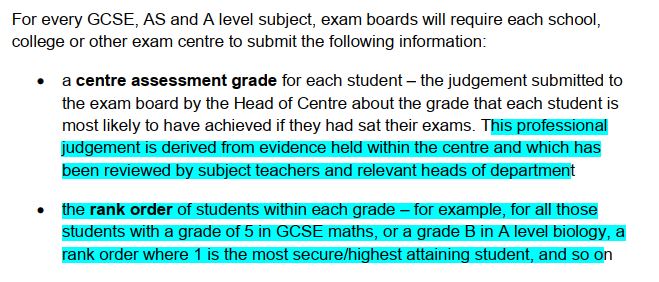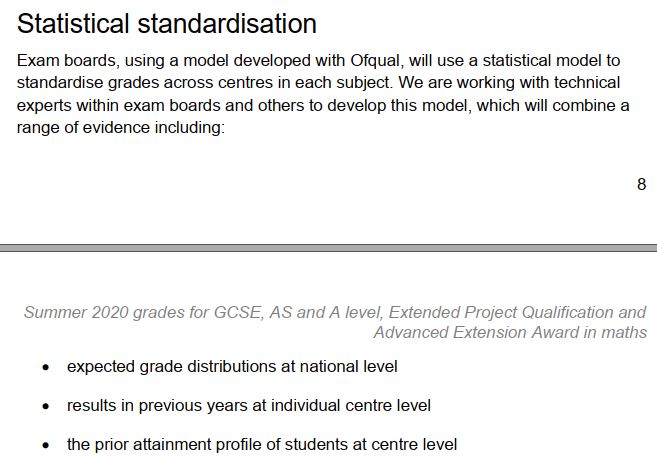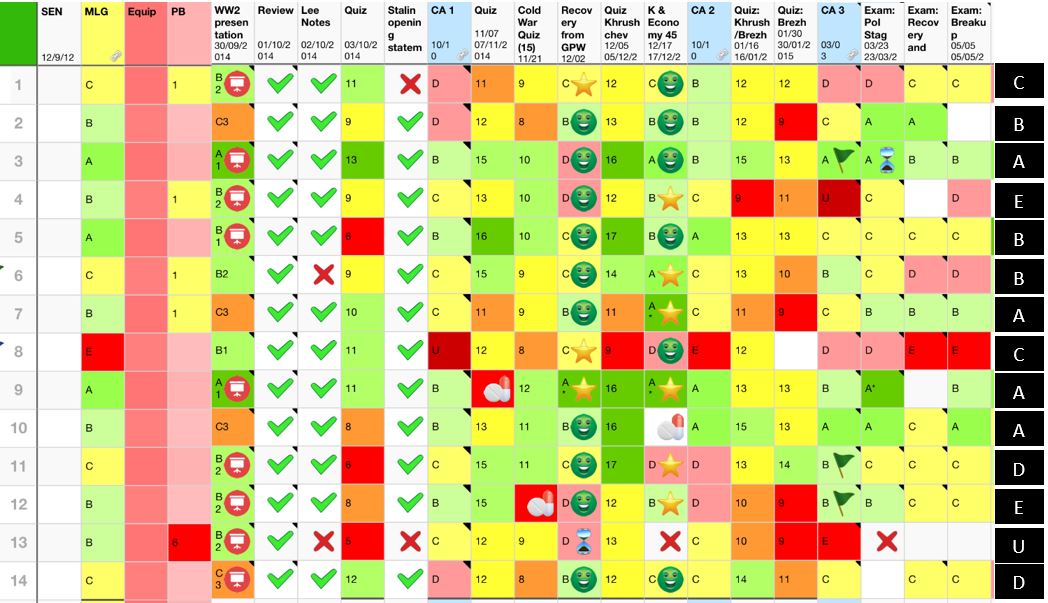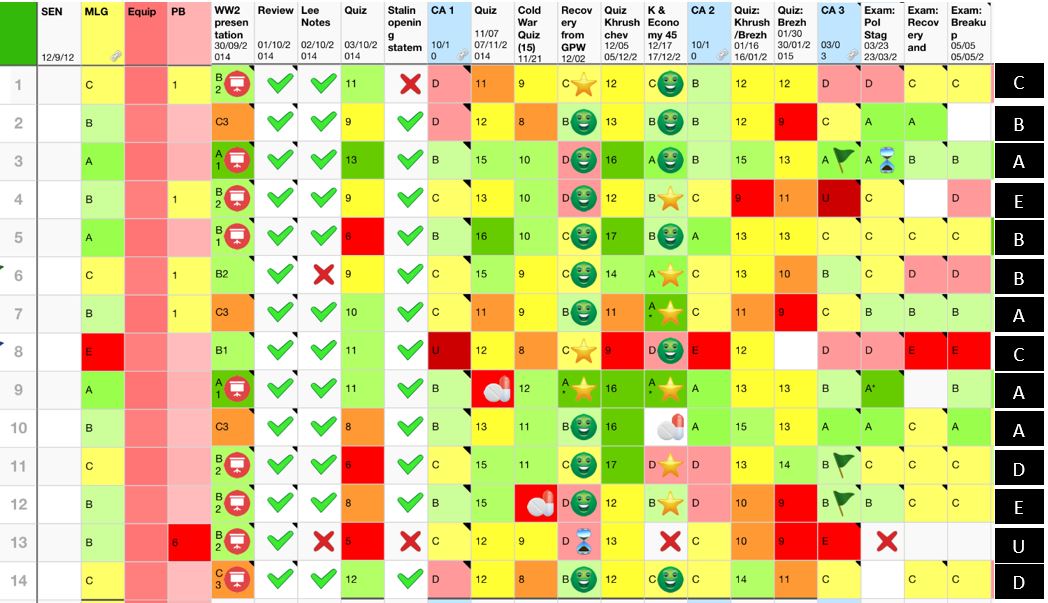The proposal for grading student exams this summer is deeply, deeply problematic. It prioritises the continuity of the exam grading system over fairness to students in a time of significant upheaval. Here are 6 reasons why I think this needs to change:
1) Much of the system relies on teacher judgement. We already know that this is flawed in many ways. Teachers are prone to over/under estimate performance for different groups AND many new teachers find prediction much harder for obvious reasons. See @Positivteacha for egs.
I realise all schools will work hard to make this work. Indeed @HistoryKss has written a great blog ont he subject https://medium.com/@kristian.shanks/more-questions-than-answers-over-ofquals-gcse-and-a-level-grade-award-proposals-f3770a0aa1b7
But">https://medium.com/@kristian... that doesn& #39;t make it right (and just a few years ago, @educationgovuk were telling us all that teacher assessment was terrible!)
But">https://medium.com/@kristian... that doesn& #39;t make it right (and just a few years ago, @educationgovuk were telling us all that teacher assessment was terrible!)
2) Rank ordering is just ridiculous. Such fine-level judgements are surely impossible. It was hard enough when "rank ordering" 200 pieces of coursework and that had the benefit of the work actually being there to look at. This action will only accentuate the flaws in the system.
Even the language being used is problematic here. We know that many other unconscious biases affect teacher predictions of student performance.
3) Rank ordering is only needed because @ofqual seem to have taken the view that preserving the GCSE grading system, whereby students are placed into statistical bands, is the most important thing here. This is a failure to think about the needs of the students first.
Any system this year will rely on non-examination judgements so the questions should really be: what is the most appropriate form for this to take to enable students to take their next steps in life. The answer to this might not be (and my view isn& #39;t) grades.
There is a wider point about the way exams work. I have written about it before here: http://www.andallthat.co.uk/blog/examinations-the-gilded-age">https://www.andallthat.co.uk/blog/exam... and http://www.andallthat.co.uk/blog/examinations-searching-for-gold">https://www.andallthat.co.uk/blog/exam... and http://www.andallthat.co.uk/blog/examinations-after-the-gold-rush
In">https://www.andallthat.co.uk/blog/exam... a normal year there is a case to be made for standardising exam outcomes. But this is not a normal year.
In">https://www.andallthat.co.uk/blog/exam... a normal year there is a case to be made for standardising exam outcomes. But this is not a normal year.
4) Even the idea that a grade 7 in 2020 will be in any way comparable to a grade 7 from 2019 or 2022 is just laughable. These students will have completed significantly less of their course. The use of grades creates an illusion of continuity when there is none.
The question is what these grades tell us in a & #39;normal& #39; year? For the most part they help others determine whether a person might be suitable for a post, job, course etc. There are ways to do this without grades. The class of 2020 will always be an exception- we could change.
5) It would be perfectly possible to have a system whereby students are given access to their next step - whatever that happens to be. Indeed, many will be giving a lot of thought to this. Systems could be devised to do this job and avoid the disaster of ranking students badly.
Access to A Level is generally straightforward and could be achieved via a system of teacher created references. This would also work for those going into other work or training. Universities could interview their applicants and would also have the capacity to set assignments.
6) All of this is a question of morals and not statistics. Statistics can tell us what is likely in a whole population, but it misses all those individual stories of success and failure. Statistics ignore the fact that some would have broken the statistical pattern.
I hear the argument that not grading is unfair on those who have worked hard. But those students won& #39;t be disadvantaged by removing grading. However, others might well be disadvantaged if they are incorrectly graded (as will certainly happen).
Let& #39;s look at this A-Level class. Column 3 is the statistical prediction of their result, the black column is their final grade. CA1-3 are formal assessments. Three mock questions are done towards the end. None of these were full papers on the full syllabus.
Let& #39;s compare the statistical prediction to the final grade. For students 4, 5, 6, 7, 8, 10, 11, 12, 13 and 14 they are out by a grade or more. Sometimes higher, sometimes lower. And a grade makes a big difference, especially if we pretend these grades are the same as last year.
Let& #39;s look at class performance over the final 4 assignments. Things tally well for a few, but students 5, 6, 7, and 8 did better than class work predicted, while students 4, 11, 12, and 14 did worse. There is of course a story behind each because exam results are about people.
Look at student 8. Any prediction of their performance would have done them a huge disservice. They struggled massively with history, but worked constantly between Easter and the summer exam to do well.
And of course, teachers are being asked to predict from classwork in March. On this metric, Students 2, 7, 8, 9, 11, 12, and 14 would all have been predicted fairly inaccurately. The root problem here is that grading adds a level of certainty to results which won& #39;t exist in 2020.
As teachers we have to think about what is best for our students. What Ofqual have come up with is a system which is easiest for future employers and safest in terms of challenging the current exam system. To me that is a failure of imagination with significant moral consequences

 Read on Twitter
Read on Twitter






